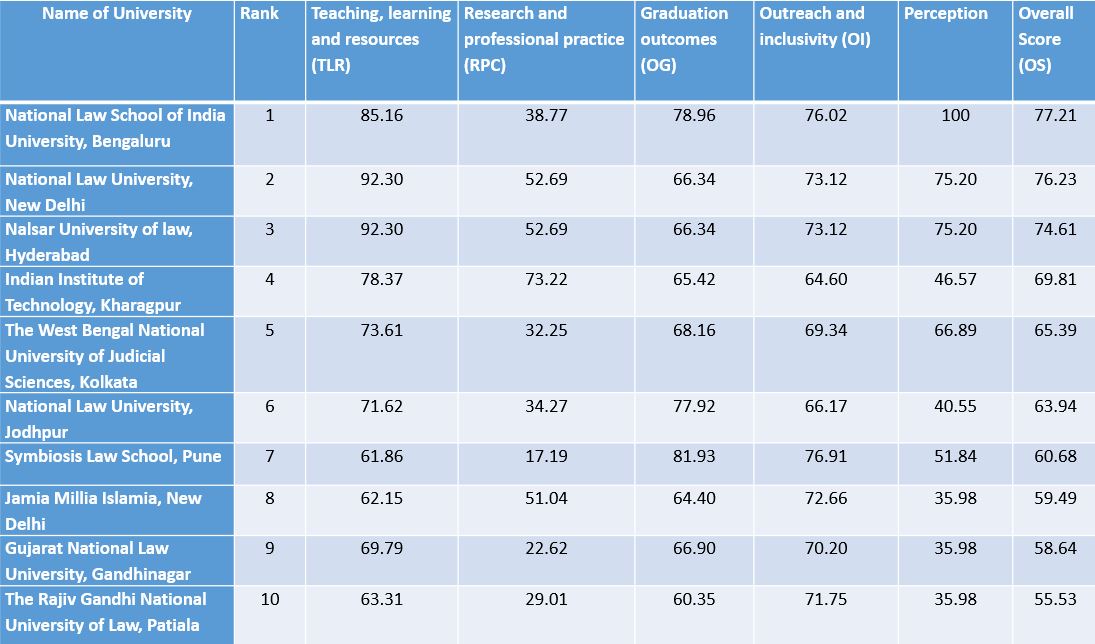TOP 10 Law Colleges In INDIA - PendulumEdu
2019-07-03 | Team PendulumEdu
The legal profession in India has always been one of the most prestigious professions that attract many students every year. The famous quote ‘Sky has no limits’ fits perfectly to the legal profession which is undoubtedly limitless. Every year the opportunities for a law graduate in India are constantly rising (in the corporate sector, government services, litigation, and Judiciary, etc.) and so is the number of law graduates. To flourish in the highly competitive legal field having an extremely large number of aspirants as your competitors, you need to reserve your berth in a Grade ‘A’ premium law institute.

Minister of Human Resource Development launched the National Institutional Ranking Framework (NIRF) on 29th September 2015. The institutes are ranked on the basis of 5 distinct parameters,-Teaching, learning and resources; research and professional practice; graduation outcomes; outreach and inclusivity; and Perception. Based on these parameters the institutes are marked on a scale of 100.
Recently, NIRF launched its rankings for the year 2019 for Educational institutes in India, including a separate list of top law schools/universities in the country. The top 10 law colleges in India as per NIRF, 2019 data are listed below along with their Score in each Parameter:
1. National Law School of India University, Bangalore
Established:
NLSIU, Bangalore came into existence in 1986 through a notification under the National Law School of India University Act (Karnataka Act 22 of 1986). It is the first National law university established in India. Its Regular academic activities with its first batch kick-started in 1988. The Chief Justice of India is the Chancellor of the University.
Courses Offered:
NLSIU, Bangalore has consistently maintained its top rank among law colleges and universities in India for both under-graduate as well as Post-graduate courses. However, it only offers B.A. L.L.B and not BBA. L.L.B or B Com. L.L.B.
Fee Structure:
The fees for a five-year law undergraduate course at NLSIU Bangalore is Rs. 11,84,000 (Rs. 2,62,000 for 1st year and Rs. 2,30,500 per year for next 4 years).
How to get Admission:
Till 2008, the institution took admissions through a national level entrance test. After 2008, the test became a National level common admission test known as the Common Law Admission Test (CLAT).
Placements:
The institution has a track record of near 100% placements and average salary to its law undergraduate amounts to nearly 14 lakh Rs per annum.
About Campus:
Situated in the Silicon Valley of India, the city of Bangalore in Karnataka, the institution is located at a distance of just 10 km from the City Railway Station.
The campus is spread over an area of 23 acres. It is a fully residential university with three halls of residence each for Men and Women in the under-graduate course and two hostels for post-graduate women. In addition, it has three blocks for faculty quarters and two blocks for non-teaching staff quarters.
It has around 500 students on its campus. The university has a trimester system, i.e. three semesters per academic session. Life at NLSIU, Bangalore is quite busy, there are four and a half hours of classes every weekday, in addition to the regular classes, the students have to cope up with the trimester system and also have to prepare a number of Research papers and Projects. The campus has facilities like Library, Cafeteria, Medical facilities, Wi-Fi Campus, Auditorium, Labs and Gymnasium.
2. National Law University, New Delhi
Established:
NLU, Delhi was established in 2008 by Act I of 2008 of NCT Delhi. Within a span of 11 years, the institution has become one of the top law schools in the country. The lush green campus is situated in Dwarka, the westernmost part of the national capital.
Courses Offered:
The University has been accredited ‘A’ grade by NAAC with a whooping score of 3.59 on a four-point scale and offers 5 years B.A. L.L.B (Hons) integrated program to its undergraduate students and a one-year L.L.M degree in Post-graduation. In addition, it also offers PG Diploma and Ph.D. courses.
Fee Structure:
The fees for 5 years integrated law program at NLU, Delhi is Rs. 8,40,000 (Rs. 1,86,000 for first year and Rs. 1,63,500 p.a for next four years).
How to get Admission:
Unlike all the other NLUs, NLU, Delhi doesn’t consider the CLAT exam for the intake of batches and has a separate entrance test for admission to its undergraduate law Programme. The test is called the All India Law Entrance Test (AILET). The difficulty level of AILET is more than that of CLAT and it is the most difficult undergraduate law entrance test in the country.
Placements:
The NLU, Delhi has scored stupendous in Placements of its students with a 100% placement of its 2019 batch, with a whooping median salary of almost 14 lakh Per annum.
About Campus:
The campus has all basic amenities and the college crowd and teaching faculty are exceptionally good. Moreover, there is a cafeteria, an Amul outlet and a Café Coffee day within the college campus, and for late-night, food Vending machines are available near hostels.
It has a beautiful seminar room with a huge seating capacity in which conferences are conducted round the year along with numerous national as well as international level lectures by eminent jurists. It has also a big and beautiful Moot courtroom. The Indian Pre-moot of the William C. Vis moot is organized by the University. This Pre-moot has been recognized as South-Asia’s biggest Pre-moot. Life at NLU, Delhi is challenging, as students are involved in lots of projects, and research papers work, but once the student learns to manage the time and cope up with the pressure, the institution provides one of the best college life in India.
3. NALSAR University of Law, Hyderabad
Established:
National Academy of Legal Studies and Research (NALSAR University of law), Hyderabad was established in 1998. NAAC has accredited A+ grade to this institution with a score of 3.60 on a scale of 4.
Courses offered:
NALSAR offers a degree in Law as well as in Management streams. For B.A.L.L.B (Hons) it relies upon CLAT whereas, for admission to its MBA course (total of 60 seats), it considers scores of CAT, GMAT and XAT exams.
Fee Structure:
The fee structure for B.A.L.L.B (Hons) course at NALSAR is Rs.7,30,000 per annum.
How to get Admission:
It is at the second spot just behind NLSIU, Bangalore among the NLUs that take admissions through CLAT. The university offers a total of 120 seats in its first-year batch for law undergraduates. Over the years, the closing rank in CLAT for admission to NALSAR has been 138-140 over the years.
About Campus:
Spread over a vast area of 55 acres, it has the biggest Campus among all NLUs. The greenery of nature surrounds in and around the campus making the environment appealing and pleasing to anybody. The campus is Wi-Fi enabled with high-speed internet connectivity and the infrastructure is fine with beautiful architecture all over the campus.
4. Indian Institute of Technology, Kharagpur
Established:
The Rajiv Gandhi School of Intellectual Property law situated in the West Bengal capital, Kolkata was set up in 2006 under IIT, Kharagpur within its campus in collaboration with George Washington University Law School, Washington DC. It is the only law school in India that comes within the ambit of an IIT, and also the first law school in India that imparts full-time intellectual property education.
Courses offered:
The institution doesn’t offer undergraduate law degree, and one can apply here for admission only after graduation. Courses offered include 3 years LL.B (Hons) program and a 1-year LL.M.
Fee structure:
The annual fees for LL.M are Rs. 1,55,500 and for LL.B (Hons) is Rs. 1,33,900.
How to get Admission:
The institution conducts its own entrance test and offers a three-year full-time L.L.B (Hons) degree after graduation. The entrance test is followed by a Personal Interview.
About Campus:
IIT Kharagpur is the largest among all IITs in terms of campus area with a vast area of 2100 acres. The Rajiv Gandhi School of intellectual property law is situated within its Campus and has all basic amenities. The school’s building is newly built, with Wi-Fi accessibility. It has a spacious moot courtroom and a big personal auditorium and library. In addition, the classes are fully air-conditioned and are well equipped with overhead projectors along with speakers. It has one of the best infrastructures out of all the schools within the IIT Kharagpur campus.
5. The West Bengal National University of Juridical Sciences
Established:
West Bengal NUJS is ranked 3rd among the NLUs participating in CLAT. The premium law institute is situated in the heart of Kolkata in Salt Lake City and has a total of 124 seats available for its undergraduate law course. It was established in 1999.
Courses offered:
The courses offered include B.A. L.L.B (Hons) in the under-graduate category; 2 years LL.M and M.Phil. Law in the post-graduate category; and LL.D and Ph.D. law in Doctorate category.
How to get Admission:
The university takes admission for its undergraduate and postgraduate courses through CLAT (CLAT UG and CLAT PG).
Placements:
Not only national but various international law firms (like Magic Circle, Herbert Smith, etc.) have also approached its campus to recruit law graduates passing out of this esteemed institution.
About Campus:
The University Campus is spread over a small area of 5 acres of land, and it is one of the smallest NLU (in terms of area) in the country, but still, it has all A-grade amenities that a premium law institute should have. The halls of residence of boys and girls have a total capacity of up to 500 students. The college life at West Bengal NUJS is wonderful, with a perfect combination of academics and extra-curricular activities round the year.
The institute also organizes one of India’s largest cultural and sports law fest named ‘Outlawed’ and ‘Invicta’ every year in the second week of February.
However, the institute lacks in providing enough sports facilities in its small campus and has, therefore, tied-up with Sports Authority of India (SAI) to use its Sports complex.
6. National Law University, Jodhpur
Established:
NLU, Jodhpur was established in 1999 by National law University, Jodhpur Act, 1999 made by Rajasthan State Assembly. Since then, it had constantly been appearing in the list of top five NLUs. The NIRF has ranked it at 6th Spot among the law institutes in India. While among the 21 NLUs it is placed at 4th position.
Courses offered:
In the undergraduate category, the institute offers B.A. L.L.B (Hons), B.B.A. L.L.B (Hons) and B.Sc. L.L.B (Hons).
Fee Structure:
The fees for 5 years undergraduate law course is Rs. 1,74,300 per year.
How to get Admission:
NLU, Jodhpur takes the intake of its students on the basis of their score in CLAT.
About Campus:
NLU, Jodhpur provides one of the best ambiances required for quality legal education. The halls of residence for students are situated very close to the classroom area, at just 3 minutes’ walk. The classrooms are well equipped with all modern facilities like Projector, Speakers, etc. The university has a big conference hall with a seating capacity of 275 people.
The university also has a well-furnished science laboratory for students pursuing B.Sc LL.B (Hons.).The university also has a State Bank of India branch within its campus, providing students all banking services at their doorstep. The location of the NLU, Jodhpur is 12kms away from the main city which adds to its disadvantage.
7. Symbiosis Law School, Pune
Established:
Symbiosis law school, Pune was established in 1977 and was earlier affiliated to University of Pune but later on, in 2002 it became part of Symbiosis International University. It is the only private law school that is included in the list of Top 10 law institutes in India (as per NIRF data).
Courses Offered:
SLS, Pune offers a law degree in B.A.LL.B (Hons) and BB.A.LL.B (Hons) in the undergraduate category. In addition, it also offers 3 years LL.B course and a 1-year LL.M degree in various disciplines of law. It also offers a number of Diplomas in Law.
Fee Structure:
SLS, Pune has a fee structure of Rs.3,00,000 per annum for five years integrated law course.
How to get Admission:
The entrance exam to get admission into Symbiosis law School is SLAT (Symbiosis law entrance test). Till 2018 the official name of SLAT was SET (Symbiosis entrance test). After clearing SLAT, the candidate must appear for a Personal interview and writing ability test (PI-WAT) following which his/her admission to this institute is finally approved.
There are three participating institutes in SLAT including SLS, Pune. The other two are SLS, Noida and SLS, Hyderabad. The three jointly comprise a total of 720 seats (300 for B.A.L.L.B(Hons) and 420 for B.B.A.L.L.B(Hons) and the total no. of applicants for SLAT from all over India were above 15,000 in India.
About Campus:
The best thing about SLS, Pune is that it is situated in the heart of Pune city, which is also known as the oxford of the east. The environment, in and around the campus is awesome. The conveyance facilities are easily available, as it is situated very close to the Pune, airport. It shares its campus with Symbiosis School of liberal arts.
8. Faculty of Law, Jamia Millia Islamia, New Delhi
Established:
The faculty of law, Jamia Millia Islamia is situated in South Delhi, within the University campus. It has been among the top 10 law institutes in the country. It was established in 1989. In 2017 the India Today Magazine ranked the law faculty of Jamia Millia Islamia at 1st Spot among the top 14 universities in the country.
Courses offered:
Since 2002 it has replaced the 3 years law Programme with 5 years integrated B.A.L.L.B (Hons) course. It also offers LL.M and Ph.D. degrees in various law subjects.
Fee Structure:
The fees for B.A. L.L.B (Hons.) (Regular) is 10,000 rupees per annum while the fees for B.A. L.L.B (Hons.) (Self-finance) is 40,000 rupees per annum.
How to get admission:
The faculty conducts its own entrance test known as ‘Jamia Millia Islamia Law entrance test’ for the intake of students on a total of 120 seats (60 regular and 60 self-financed).
About Campus:
The lush green campus of the Faculty of law is situated within the University campus. The infrastructure is fine with almost all basic facilities required by a premium law institute. The faculty has its own fully air-conditioned library, conference room, and Moot courtroom. The classes are spacious, with a lot of cross-ventilation, and are equipped with all basic equipment, like an overhead projector and display screen. The campus is fully Wi-Fi enabled and has the subscription of almost all online databases for law students like Manupatra, SCC online, etc.
The Faculty of law doesn’t have its own separate building but, shares the building with Centre for Management Studies, Jamia Millia Islamia.
9. Gujarat National Law University, Gandhinagar
Established:
The GNLU was established in 2004 under the Gujarat National law university act, 2003. The campus is spread over a vast area of 51 acres of land.
Courses offered:
It has a total of 80 seats for B.A.L.L.B (Hons) and 25 seats for B Com L.L.B (Hons).
Fee Structure:
The total fee for both undergraduate law programs is Rs.11.97 lakh.
How to get Admission:
It takes admission by way of CLAT and is ranked 9th among all the law schools and 6th among NLUs.
About Campus:
The campus is spread over a vast area of 51 acres of land. The campus has a VIP and training residency that provides the best hospitality services to its guests. The Computer Local Area Network has more than 230 Computer Systems and 13 Servers and connects all the departments and buildings on the Campus. The campus is situated very close to Apollo Hospital, and Medicare facilities are also available within the campus in the hostel complex.
10. Rajiv Gandhi National University of Law, Patiala
Established:
The RGNUL, Patiala was established in 2006 and shifted to its present location in 2013.
RGNUL offers B.A.LL.B. (Hons.)Five-Year Integrated Programme, one-year LL.M. Post Graduation Course with specialization in Business Law, Constitutional Law, Criminal Law, and International Law and Ph.D. program in Law
Fee structure:
The annual fees for five years integrated law course at RGNUL, Patiala is Rs. 2,06,000.
How to get Admission:
The total no. of seats available for B.A. L.L.B (Hons) at RGNUL is 180 and participates in CLAT for admission to its undergraduate law course.
About Campus:
The university has an area of 47 acres of land and is situated in a pollution-free environment. Its Library has been acknowledged as Asia’s largest library on a single subject.
In order to fulfill one’s dream to get admitted to one of these top 10 law colleges, the aspirant must work hard with great passion and practice mock tests. The CLAT aspirants should try the CLAT free mock test at PendulumEdu.
Share Blog






Comments